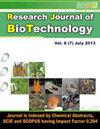磁场在离体植物细胞和组织培养研究中的应用评估
IF 0.2
Q4 BIOTECHNOLOGY & APPLIED MICROBIOLOGY
引用次数: 0
摘要
磁场可以影响植物的结构、生理和生化。在培养的植物细胞和组织上使用磁场已被证实。传递磁通量的系统非常重要。实验方法是将培养物直接置于永磁磁源的磁场附近。这种系统提供的磁场强度是固定的。电磁体是向植物提供磁场的更好模式,因为它很容易提供量身定制的磁暴露。大多数此类研究使用的磁场强度在毫特斯拉左右,其中一些研究使用了高达 17.8 特斯拉的高磁场。这些实验还利用了不同的暴露时间和对南北极的不同暴露。这些研究报告了许多参数的增加或减少,如细胞大小、形状、代谢物含量、叶绿素含量和酶活性。大多数讨论植物趋磁性的研究都是利用种子或完整的植物来发现磁场对植物的影响。这些研究也让人们对磁场的作用机理有了一定的了解。使用植物细胞培养系统可以培养单细胞和小细胞聚集体。因此,体外系统为了解细胞水平的作用机制提供了一个极好的工具。本文章由计算机程序翻译,如有差异,请以英文原文为准。
An assessment of the application of magnetic fields in the study of in vitro plant cell and tissue cultivation
The magnetic field can affect the structure, physiology and biochemistry of plants. The use of magnetic fields on cultured plant cells and tissues is a proven fact. The system to deliver magnetic flux is very important. Experiments have been performed by directly placing cultures in the vicinity of the magnetic field from a permanent magnetic source. Such a system delivered a fixed magnetic strength. Electric magnets are a better mode to deliver magnetic field to plants because it is easy to deliver tailor-made magnetic exposure. Majority of such studies utilized a magnetic field in the order of milliteslas, some of them utilized a high magnetic field upto 17.8 Tesla. The experiments also utilized varying exposure times and differential exposure to the north or south pole. Such studies reported either an increase or decrease of many parameters such as cell size, shape, metabolite content, chlorophyll content and enzyme activity. Most of the studies discussing magnetotropism on plants utilized seeds or intact plants to find out the effect of magnetic fields on plants. Such studies also give some understanding of the mechanism of action. Using a plant cell culture system, it is possible to grow single cells and small cell aggregates. Therefore, in vitro systems offer an excellent tool to understand the mechanism of action at the cellular level.
求助全文
通过发布文献求助,成功后即可免费获取论文全文。
去求助
来源期刊

Research Journal of Biotechnology
BIOTECHNOLOGY & APPLIED MICROBIOLOGY-
CiteScore
0.60
自引率
0.00%
发文量
192
期刊介绍:
We invite you to contribute Research Papers / Short Communications / Review Papers:
-In any field of Biotechnology, Biochemistry, Microbiology and Industrial Microbiology, Soil Technology, Agriculture Biotechnology.
-in any field related to Food Biotechnology, Nutrition Biotechnology, Genetic Engineering and Commercial Biotechnology.
-in any field of Biotechnology related to Drugs and Pharmaceutical products for human beings, animals and plants.
-in any field related to Environmental Biotechnolgy, Waste Treatment of Liquids, Soilds and Gases; Sustainability.
-in inter-realted field of Chemical Sciences, Biological Sciences, Environmental Sciences and Life Sciences.
-in any field related to Biotechnological Engineering, Industrial Biotechnology and Instrumentation.
-in any field related to Nano-technology.
-in any field related to Plant Biotechnology.
 求助内容:
求助内容: 应助结果提醒方式:
应助结果提醒方式:


